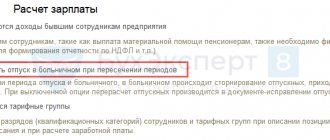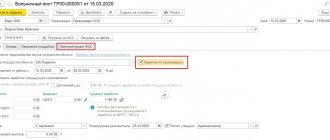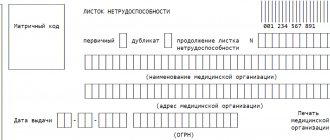The employer dismisses on his own initiative
In this case, if the employee is on sick leave, it is prohibited to terminate the contract for all reasons except the liquidation of the employer (clause 1, part 1, article 81 of the Labor Code of the Russian Federation). For the dismissal of a manager under clause 2 of Art. 278 of the Labor Code of the Russian Federation, the ban also applies. This was pointed out by the Supreme Court of the Russian Federation[1].
Let's consider several situations where the employer has every chance that the dismissal will stand in court, despite this prohibition.
Sometimes employees hide their inability to work, and then try to challenge the dismissal in court.
A good example is termination of a contract for absenteeism . If the employee did not report that he was absent for a good reason and did not hand over the sick leave, the court may regard this as an abuse of right. A similar case occurred in the practice of the Sverdlovsk Regional Court[2]. Dismissal for absenteeism was recognized as legal.
The Moscow City Court also noted: if the employer at the time of dismissal did not know and could not know about the employee’s temporary disability, then he should not be held responsible for the adverse consequences[3].
The Orenburg Regional Court also supported the employer when, during dismissal due to redundancy, the employee concealed the fact that he was temporarily disabled[4].
Sometimes sick leave is opened directly on the day of dismissal, but after familiarization with the order to terminate the contract.
Considering the situation when the employee was informed of the dismissal order for repeated misconduct , and after about four hours he received sick leave, the Moscow City Court sided with the employer[5].
In a similar case, the legality of the dismissal was confirmed by the Chelyabinsk Regional Court[6]. A couple of hours after reading the dismissal order, the employee was called an ambulance. On the same day, sick leave was opened. The court indicated: at the time of dismissal, the event that prevented him did not occur. This means that the termination of the contract with the manager was legal.
What the employer cannot influence
Often, an employee’s health allows him to perform his work function, because the presence of long-term health restrictions indicates significant limitations in life activity and entails establishing the degree of loss of professional ability, i.e. recognition of an employee as disabled.
Disability, as the loss of the opportunity to work at full capacity, is the object of social insurance (Articles 1.2, 1.3, 2 of the Federal Law of December 29, 2006 N 255-FZ “On compulsory social insurance in case of temporary disability and in connection with maternity”) .
If necessary, a citizen has the right to seek medical help at any institution convenient for him, to any doctor who, if indicated, draws up the relevant documents, including a sick leave certificate.
The very fact of a citizen applying to a medical institution, not to mention information about the disease, is considered a medical secret. Accordingly, neither a medical organization nor any employee of this organization can provide legally protected information to an inappropriate person. In this situation, the employer himself applies.
It is the information protected by law that does not allow the employer to make a request about the employee’s disability to a medical organization, and the medical organization to provide the employer with data about the citizen’s illness.
The employee leaves on his own initiative or by agreement of the parties
Dismissal on these grounds during sick leave is not prohibited, and practice confirms this.
An example is the case considered by the Saratov Regional Court[7]. The employee filed a request to dismiss her “on the same day.” On this date, a certificate of incapacity for work was opened for her due to the child’s illness. The employer fired the employee. The court of first instance decided to postpone the date of termination of the contract to the day of leaving sick leave. However, the appeal did not agree with this approach and rejected the claim.
The Sverdlovsk Regional Court also noted that dismissal on the initiative of an employee during illness does not violate the law[8]. The court took into account that she knew about her disability already on the eve of termination of the contract, but did not withdraw her resignation letter.
Practice confirms that sick leave does not prevent dismissal by agreement of the parties . Thus, the Moscow City Court recognized the legality of termination of a contract with an employee while he was in hospital[9].
Is on sick leave how to write correctly: how to formulate it correctly in a document?
Since the document is officially called a certificate of incapacity for work, this is exactly what it should be called in writing. Most often, this is required when an employee fills out an application addressed to the company’s management to receive payments. The employee must draw up this document at the moment when he enters the completed sick leave into the accounting department. Then the application uses the following wording: “I ask you to accrue and pay me temporary disability benefits (its reason is indicated here: illness, pregnancy and childbirth, caring for a relative) for the period from January X to January Y, 2020, for a duration of Z calendar days. A certificate of incapacity for work No. xxxxxxxxxxxxxxxxx is attached to the application .
If it is necessary to state in an official document that an employee is on sick leave, then the following phrase can be used: “According to our data, an employee of the marketing department Ivanov I.I. since July 13, 2020, he has been undergoing inpatient (outpatient) treatment due to illness, which is confirmed (or not confirmed) by certificate of incapacity for work No. xxxxxxxxxxxxxx .
Previously, when issuing a certificate from a previous place of work, the following formulations were often used: “In 2022, an employee of the marketing department Ivanov I.I. was on sick leave for a total of 24 calendar days. During this time, he was paid temporary disability benefits in the total amount of xxxx rubles .
Sometimes an employee has to write an explanatory note due to his absence from work. He is not required to indicate his diagnosis in it, since this is confidential information that the employer should not have. It is enough to indicate the following: “I, I.I. Ivanov, was absent from work from 07/12/2020 to 07/16/2020 due to deteriorating health and treatment at the Central City Hospital of Kazan. This is confirmed by the certificate of incapacity for work No. xxxxxxxxxxxxx, which I am attaching to this explanatory note .
In this situation, you can use another wording: “I, I.I. Ivanov, did not show up to my workplace on July 16, 2020 for a reason related to visiting a doctor. After consultation with a specialist and additional research, an exacerbation of a chronic disease was discovered, the treatment of which required hospitalization in City Hospital No. 2 from July 17 to July 22, 2020. I confirm the fact of the treatment with certificates of incapacity No. xxxxxxxxxxxxx dated July 16, 2020 and No. yyyyyyyyyyy dated July 22, 2020, which are attached to the explanatory note .
There are situations when an enterprise may receive written requests from law enforcement agencies and other government agencies about a certain employee. Then in the official response you can use the following wording: “Company employee Ivanov I.I. Since July 14, 2020, I have not reported to my workplace. In a telephone conversation with director Petrov P.P. on the same day, he reported that he was involved in a traffic accident, where he received injuries that required hospital treatment. Certificate of incapacity for work from Ivanov I.I. as of July 22, 2020, I have not received it .
Similar formulations are used in other situations. As can be seen from the examples, in official documentation it is customary to write “was on inpatient/outpatient treatment” , “due to an exacerbation of a chronic disease, underwent surgery in the hospital” , and not “was on sick leave”. It is also important, when mentioning a certificate of incapacity, to indicate its number, which is written at the top on the back of the document.
How long is it acceptable to be sick?
Anyone can get sick, but some employees spend much more time on sick leave than at work. And the employer has a natural question: is he being deceived? And the colleagues of the “always sick” person who have to do his work are not happy either.
Previously, the law allowed an employee who was absent from work for more than four months in a row due to temporary disability to be dismissed on appropriate grounds. There is no such provision in the current Labor Code. The legislation currently does not limit the period of absence from work due to illness, even if the employee is constantly on sick leave for a year. The procedure for issuing certificates of incapacity for work, approved by order of the Ministry of Health and Social Development of the Russian Federation No. 624n dated June 29, 2011, establishes only the period for which a certificate of incapacity is issued. The doctor alone makes a decision on issuing a certificate of incapacity for work in case of illness or injury for a period of no more than 15 calendar days (paramedic or dentist - no more than 10 days). Further extension up to 30 days is permitted only by decision of the medical commission. If the work prognosis is favorable, the medical commission issues a certificate of incapacity for work for a period of no more than 10 months, and in some cases (injuries, reconstructive operations, tuberculosis) - for a period of no more than 12 months.
When a person is really seriously ill or has undergone a complex operation, nothing can be done about it. Even the most stern managers, as a rule, treat such a situation with understanding. But when an employee is on sick leave all the time - he goes to work for a couple of days and disappears again, or closes one certificate of incapacity for work, and the next day opens the next one with another doctor - in such cases, doubts are well founded. And if an employee also returns after an illness tanned and refreshed, or is seen during an “illness” in places that are not entirely suitable for the sick person (clubs, etc.), doubts about the employee’s integrity almost develop into confidence. What can the employer do in this case?
Maximum duration of sick leave for various diseases
If after 15 days the patient has not recovered, then the attending physician sends him to undergo a medical examination, which determines the need to extend the BL. If the patient was treated in a private licensed clinic, then after 15 days the doctor will also refer him to the medical institution at the place of registration (residence) so that the issue of extending the BC can be decided by a commission of doctors (Article 21 of Order No. 1089n). If the prognosis for recovery is favorable, the maximum period of time spent on sick leave cannot exceed 10 months. Sometimes this period can be extended to a year for diagnoses:
- tuberculosis;
- condition after surgery;
- long-healing injury.
In this case, the patient must be seen by a doctor to assess the condition and prolong the BL every 15 days.
If the treatment prognosis is unfavorable, no later than 4 months from the date of establishment of temporary disability, the patient is sent to undergo a medical and social examination (MSE). And if the patient refuses to undergo it, the ballot is closed (clause 4 of article 59 of the law “On the fundamentals of protecting the health of citizens of the Russian Federation” dated November 21, 2011 No. 323-FZ).
ConsultantPlus experts spoke about how a certificate of incapacity for child care should be filled out. Get free trial access to the system and move on to the ready-made solution.
Read about the specifics of paying for long-term sick leave in the material “What are the nuances of paying for long-term sick leave?”
What are the consequences for an employer of going to work on sick leave?
For an employer, the least that can result from an employee’s illegal presence in the workplace is a fine in accordance with Art. 5.27 Code of Administrative Offenses of the Russian Federation.
If, as a result of involving a patient in work, a complication of his underlying disease occurs, then he can easily claim compensation for harm caused to health (Articles 22, 220, 232, 233, 237 of the Labor Code of the Russian Federation).
Troubles will also arise if something happens to a subordinate at the workplace. Such an incident will be classified as a work injury.






